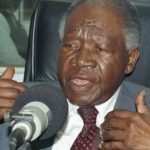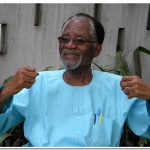Nigeria National Assembly: Jumbo Pay For Little Work
Posted by By Akogun Akomolafe at 17 February, at 20 : 00 PM Print
Warning: count(): Parameter must be an array or an object that implements Countable in /home/alaye/public_html/wp-content/themes/Video/single_blog.php on line 46
Warning: count(): Parameter must be an array or an object that implements Countable in /home/alaye/public_html/wp-content/themes/Video/single_blog.php on line 56
In their recent confrontation with the governor of the Central Bank of Nigeria (CBN), Mallam Sanusi Lamido Sanusi, members of the Nigerian National Assembly (NASS) got more than they bargained for.
If they had thought that they could intimidate the Nigerian top banker, they were easily and sorely disappointed, as their supposed victim ended up badly mauling them.
It was really an unnecessary confrontation the NASS could have easily avoided. But those whom the gods want to humiliate, they first made them lose reason.
In an innocuous address at a local university, the central banker had said that if Nigeria must get it right, there must be cuts in its revenue expenditures and focus should be placed on policies that engender real development.
It was a sentiment that gladdens the heart of downtrodden Nigerians who have watched helplessly as their leaders continue to lavish the country’s shrinking resources on themselves whilst social services crumble.
Speaking at the eighth convocation ceremony of privately-owned Igbinedion University, Okada, Edo State, on the topic: “GROWTH PROSPECTS FOR THE NIGERIAN ECONOMY,” Sanusi had said: “If you look at the budget, the bulk of government’s revenue expenditure is on overheads; that is a big problem; 25 per cent of overheads of the federal government goes to the National Assembly. We need power, we need infrastructure, so we need to start looking at the structure of expenditure and make it more consistent with the development initiative of the country.”
Sanusi correctly opined that the current situation where 25 percent of the government’s revenue spending yearly goes to the National Assembly is unhealthy for the country and its economy.
This got the goat of NASS; they bayed for the blood of the governor and received their just comeuppance.
This Swans column has chronicled the greediness of Nigerian “legislooters” who are said to be the highest paid in the world and yet are rated below par in performance.
Sanusi’s assertion sent normally placid Nigerians baying for blood and sent the usually combative legislators scurrying for cover.
On several occasions debates in the NASS have degenerated into fisticuffs and Nigerians are asking why they should expend so much of their money into maintaining boxers and wrestlers even if they call themselves “Honorables.”
Questions were asked about how on earth about 600 members of NASS could appropriate 25% of the budget to themselves in a country of 150 million people where infrastructures are primitive.
Naturally, Sanusi’s assertion drew the ire of the legislooters with their bloated egos. They fumed, puffed, cajoled, threatened, and finally hauled the Nigerian top banker to their chambers. It was a decision that they will rue for a very long time.
Not only did Sanusi stand his ground, he called the bluff of the NASS member by threatening to resign rather than apologize for his statement. That was a novelty in a country where the allure of his office would make an official stay put in office even when his position has become totally untenable.
What’s baffling is why the legislators decided to nit-pick Sanusi’s speech. After all, he mentioned the National Assembly only in passing. His two-hour-long speech was wide-ranging: The central banker lamented that whilst several countries that Nigeria helped to get out of wars are getting their economies right, Nigeria is still groping in the dark. He said:
A country like Ethiopia, which came out of war not long ago is growing at 11 percent yearly and by 2012, Ethiopia will be generating 4,000 megawatts of electricity, which is more than what Nigeria is generating today. It is one thing to complain about Nigeria’s problem, the situation is heightened when you see pockets of success around Africa.
In 10 years, if we do not adopt the right policies, the Ghanaian economy could overtake our economy on per capita basis. Look at Angola, we helped that country end a civil war and now Angola is exporting more oil than Nigeria. In fact, Angola has gone further on diversification. There is a big problem and it is a policy problem; so, the answer is the pursuit of the right policies in the short to medium terms.
The CBN governor went on:
Agriculture is 42 per cent of Gross Domestic Product (GDP) only one per cent of bank lending goes to agriculture so the CBN is committed to increasing that proportion but that is not being done by directing banks to lend, it is being done by working with banks and with farmers and with policies to open up the sectors that banks can lend on an acceptable lending rate. Why should Nigeria be importing rice? What is it that is produced in Thailand or India that cannot be produced here? Why should we be importing all [these] products? Why should we be importing textiles? In the 1950s and 1970s, the Chinese came to Nigerian textile factories, why are we going to China to import textiles? These are issues that we need to address on quality perspective, create an environment in which capital flows into actual production, into manufacturing, into processing.
We have become a country that specialises in exporting what we do not produce and importing what we produce. Do you know that Nigeria provides electric power to Niger? We export power, we don’t have it. The military government of the late Gen. Sani Abacha conducted a free and fair election in Liberia, we exported democracy and we have not been able to conduct one in this country and anytime there are elections in African countries, Nigerian former leaders go there as election observers and these were the very people that could not conduct elections in their own country.
Sanusi said Nigeria could get it right and achieve Vision 2020 if the balance of trade is persistently positive, as it has been in the last five years.
If external reserves can be substantially built up to boost the credit worthiness of the economy and attract foreign investment, if efforts are sustained to maintain peace in Niger Delta to boost crude oil and gas output, electricity supply is increased to15,000-25,000 mw between now and 2020, to boost manufacturing and achieve capacity utilisation and activities in other critical sectors, Nigeria will make meaningful progress.
The solution to Nigeria’s problem is not in the interest of a very few group of people who have held the country to ransom. The answer lies in every Nigerian simply standing up to this group that enough is enough.
Very often you look at the problems of the country and you look at the powerful vested interest that are benefitting from these problems and you think that the problems cannot be resolved. Let me tell you one thing; stand up to them, face them, the country belongs to you and we must claim it. And the only way Nigeria will change is if we stop complaining about these people and do something about them.
In his long speech, Sanusi mentioned the National Assembly in one paragraph: “If you look at the budget, the bulk of government spending is revenue; revenue expenditure. That is a big problem; 25 percent of overhead of Federal Government goes to the National Assembly. We need power, we need infrastructure, so we need to start looking at the structure of expenditure and make it more consistent with the development initiative of the country,” but that was enough to spur the legislooters to war.
What baffles Nigerians most was the fact that the over-compensated legislooters are even too lazy to check on figures they are supposed to be over-seeing.
By law, NASS has statutory oversight over allocation and disbursement of national revenue, so one would expect the lawmakers to be versed in monetary and fiscal accounting. But this proved not to be so as many of them maintained that Sanusi was a liar who was only trying to incite Nigerians against them.
But it appears that the NASS problem was with the confusion of the words “overhead,” and “budget.” The Central Banker accused the legislooters of collaring 25% of the overhead, and not of the budget proper: “25 per cent of overhead of Federal Government goes to the National Assembly.”
According to a publication posted on its Web site titled “A CITIZEN’S GUIDE TO UNDERSTANDING THE 2009 FEDERAL BUDGET,” Nigeria’s Ministry of Finance’s defines overheads as basically costs such as payment for electricity, water, telecommunications, office rent, office equipment and consumables, staff training, transportation, etc.
This made Mallam Sanusi Lamido Sanusi dead right since the total federal government overhead budget for 2010 is 536.27 billion, of which the overhead budget of the National Assembly is 136,159,768.12. This represented the 25% the Central Banker quoted; simple arithmetic, really.
The figures were contained in the Medium Term Expenditure Framework (MTEF) and Fiscal Strategy Paper, accompanied by a letter signed by President Goodluck Jonathan and which was forwarded to the National Assembly in September 2010.
Aside from a penchant for treasury looting and self-aggrandisement, the NASS appears capable only of threatening those that question its wanton greediness and seemingly insatiable gluttonous appetite.
So totally disconnected with reality are Nigerian law-makers that they do not know or care about the depth of contempt in which their compatriots hold them. Whilst their compatriots look at them with withering contempt, they continue to admire themselves.
The showdown with Sanusi was just the latest face-off the NASS had with prominent Nigerians. Shortly before disastrous confrontation with Sanusi, a former member of the House of Representative and now Governor of Benue State, Gabriel Suswan, called the national legislators “illiterates.”
Suswan said less than 20 of the members make useful contributions at plenary sessions and sponsor motions or bills. The expensively-maintained legislators took time off to round up on their former colleague, calling him a “baby governor.”
Despite threats from NASS, Sanusi bluntly stood his ground and refused to apologise over the statement, which he readily acknowledged was made by him, that the National Assembly accounts for 25 percent of the Federal Government’s total overhead budget. “I confirm that 25 percent of total overheads of the nation goes to the National Assembly,” he said.
NASS sees things differently. According to one Senator, Sanusi’s assertion was “a trend of a calculated attempt to bring the National Assembly to disrepute. I see a plot to incite the public against us. I see a plot to bring the national assembly to disrepute. I move that the Minister of Finance and the Governor of the Central Bank appear before us to justify their allegations.”
After spending hours fulminating, NASS resolved to invite the governor of the CBN to appear before four committees of the senate to, in the words of the Senator Nuhu Aliyu of Niger State, “give him a dressing down.”
And in anticipation of what they thought was going to be a humiliating experience for the central banker, the president of the senate, Senator David Mark, ruled that the “dressing down” should be done in the full glare of the nation’s media. Wow!
Unfortunately for NASS, production didn’t go according to the script.
Twenty-four hours after the senate resolution, a confident and totally unapologetic Sanusi Lamido Sanusi’s walked into one of what was supposed to be his slaughter rooms. If he was daunted by his impending confrontation with the law-makers, the CBN chief didn’t betray it.
Sanusi’s answer to a question by the chairman of the senate committee on Appropriations, Senator Iyiola Omisore, as to why he chose to peddle wrong information in the public to set the Nigerian people against the national assembly, suggested a man that came prepared to do battle.
A defiant Sanusi Lamido Sanusi told his hosts that the figure he used to arrive at the conclusion that the national assembly is responsible for 25% expenditure of the overhead spending of the federal government was from the Budget Office and as such their quarrel should be with that office and not with him.
Sanusi 1: NASS 0
The central banker then came out swinging: “I confirm Mr. Chairman that I did say in my speech at the Igbinedion University that 25 percent of the overhead of the federal government goes to National Assembly. I have figures from the office of budget for the year 2010. Total government overhead is N536, 268, 49, 280.
Total overhead of the National Assembly is N136, 259, 768, 112, which is exactly 25.1 percent of Federal Government overhead. The overhead of the National Assembly as a percentage of the Federal Government budget in 2009 was 19.87 and in 2008 was 14.19.
“I think it was important for us to say what context that statement was made, I was giving a lecture on the growth prospect of the Nigerian economy, I talked about financial plans, economic policies, banking system and government finances and as the Finance Minister has mentioned if you look at the structure of government financing especially in 2008 and 2009, we have had a rapid increase in recurrent expenditure and decline in capital expenditure. I was warning against this,” he said.
“I gave a number and I said where this number came from. I did not abuse anyone. I did not attack anyone. I did not say anybody stole money. I was not given a chance to say the context in which I gave this number. “Nobody has heard my side of the story on why that number came in; why the 25 percent came up…
Rounding up, a pugnacious Sanusi cried: “There’s need to reduce the overheads, to reduce the expenditure, especially in government spending. I would like to add that I also spoke about government subsidy on the petroleum sector; I spoke about the banking system but the newspapers decided that this was the bit they wanted to talk about. I did not go there to talk about the National Assembly. The reference to NASS was just one sentence, in a two and a half hour lecture,” he told his visibly startled and embarrassed of his hosts.
“By my upbringing, if I’m wrong, I don’t need to be told to come and say I’m wrong and I would apologise. By my nature, if I am not convinced that I’m wrong, I do not apologise and this is really where the point is.” The governor concluded melodramatically.
It was a pungent showmanship that left the legislooters looking very foolish indeed.
Chagrined by their humiliation, the legislooters have started moves to reduce their jumbo pay and allowance.
Nigerians, the majority of whom live in grinding poverty and who, over the years, have been told to tighten their belts and make sacrifices, are crying out to know why their lawmakers (senators and representatives) should earn more salaries than their American counterparts, or why the president of their senate should earn four times as much as the president of the United States.
About the Author
Femi Akomolafe is a passionate Pan-Africanist. A columnist for the Accra-based Daily Dispatch newspaper and Correspondent for the New African magazine. Femi lives in both Europe and Africa, and writes regularly on Africa-related issues for various newspapers and magazines.
Femi was the producer of the FOCUS ON AFRICANS TV Interview programme for the MultiTV Station.
He is also the CEO of Alaye Dot Biz Limited Dot Biz, a Kasoa-based Multimedia organisation that specialises in Audio and Video Production. He loves to shoot and edit video documentaries.
His highly-acclaimed books (“Africa: Destroyed by the gods,” “Africa: It shall be well,” “18 African Fables & Moonlight Stories” and “Ghana: Basic Facts + More”) are now available for sales at the following bookshops/offices:
- Freedom Bookshop, near Apollo Theatre, Accra.
- The Daily Dispatch Office, Labone – Accra
- WEB Dubois Pan-African Centre, Accra
- Ghana Writers Association office, PAWA House, Roman Ridge, Accra.
- African Kitchen in Amsterdam Bijlmer
Where to buy them online:
On Lulu Books:
18 African Fables & Moonlight Stories https://goo.gl/Skohtn
Ghana: Basic Facts + More: https://goo.gl/73ni99
Africa: Destroyed by the gods: https://goo.gl/HHmFfr
Africa: It shall be well: https://goo.gl/KIMcIm
Africa: it shall be well
on Kindle books: https://www.createspace.com/4820404
on Amazon books: http://goo.gl/QeFxbl
on Lulu Books: https://goo.gl/SQeoKD
Africa: Destroyed by the gods
on Kindle books: https://www.createspace.com/4811974
on Amazon books: http://goo.gl/1z97ND
on Lulu Books: http://goo.gl/KIMcIm
My Lulu Books page: http://www.lulu.com/spotlight/FemiAkomolafe
Get free promotional materials here:
- Africa: it shall be well: http://alaye.biz/africa-it-shall-be-well-introduction-in-pdf/
A FREE Chapter of ‘Africa: It shall be well’ could be downloaded here: http://alaye.biz/africa-it-shall-be-well-a-free-chapter/
- Africa: Destroyed by the gods (How religiosity destroyed Africa) http://alaye.biz/africa-destroyed-by-the-gods-introduction/
A FREE Chapter of ‘Africa: Destroyed by the gods’ could be downloaded here: http://alaye.biz/africa-destroyed-by-the-gods-free-chapter/
Contact Femi:
Femi’s Blog: www.alaye.biz/category/blog
Website: www.alaye.biz
Femi on Amazon https://www.amazon.com/author/femiakomolafe
Twitter: www.twitter.com/ekitiparapo
Facebook:https://www.facebook.com/alayeclearsound;
Gmail+: https://plus.google.com/112798710915807967908;
LinkedIn: www.linkedin.com/in/femiakomolafe
Email: fakomolafe@gmail.com
Kindly help me share the books’ links with your friends and, grin, please purchase your copies.
Comradely,
Femi Akomolafe




